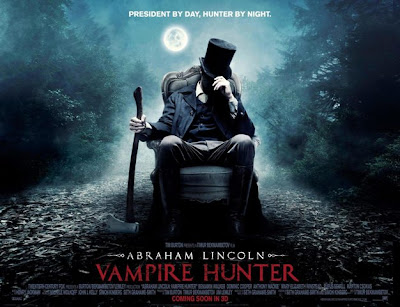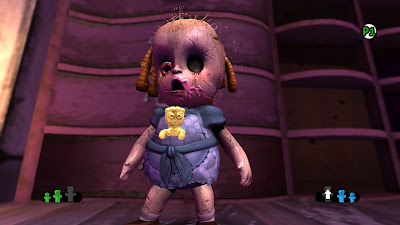PhotonWaveZero & PrincetonTigress X-Review Abraham Lincoln: Vampire Hunter
Greetings Geeks! PhotonWaveZero and new grotto dweller
PrincetonTigress here with a historically blasphemous X-Review of Tim Burton’s
latest venture into cultural oddities, Abraham
Lincoln: Vampire Hunter. Now, the opening statement of this review might be
a tad cliché, but I am going to ask you the reader to bear with me.
Read more after the jump!
Read more after the jump!
PhotonWaveZero:
The Movie...
Four score and 7 vampires ago, Tim Burton produced the
silver screen adaption of Seth Grahame-Smith’s historical fiction novel
entitled Honest Abe Goes to Transylvania..
*ehem*… Abraham Lincoln: Vampire
Hunter. Conceived in ridiculousness and directed by Timur Bekmambetov, the
film follows the story of the famous Abraham Lincoln (Benjamin Walker) and his evolution from ordinary
man into the powerful political figure we read about in history books today.
Only in this adaption, his evening hobby of killing bloodthirsty vampires is
the driving force behind his radical ascension to historical fame. A silly yet
interesting re-envisioning of the cultural icon to be sure, if not a few union
soldiers short of a full brigade at times.
While most of us probably looked at the promotional posters
back in the summer of 2011 and literally ‘ROFLed’ at the very idea of it (I
certainly did), I must say - the concept actually worked for me. The movie takes one of the most beloved
political figures in all of American history, and turns him into an
axe-wielding, vampire-slaying superhero that does more than just chop down
cherry trees (Sorry, George, but you’ve got nothing on Abe in the chopping
department). He’s got vengeance in his heart, and he’ll stop at nothing to get
it. The idea is cool in theory, but doesn’t pan out well over a 2-hour period.
One key issue I had with the film was its supreme lack of
imagination. History and vampire mythology are two very rich subjects to draw
from, but sadly, the end result is less than stellar. It’s a bit of a shame,
because there are a lot of good ideas here, especially at the beginning of the
film, where it retools Abe’s vengeful origin story into something indicative of
DC’s Batman, but that’s truly where the magic stops. The plotline is very thin
given its rich premise, which is surprising to me, especially since screenplay
writer, Seth Grahame-Smith, was also the writer of the book. I won’t give too
much away here, but don’t expect much explanation as to why the vampires even
exist, or where they came from for that matter. It’s almost as if the novel was
originally titled, “_______: Vampire Hunter”,
as the plotline is so weak, you could’ve thrown Bugs Bunny in the role, and
it probably would’ve worked all the same.
The film is saved from being just another nightmarish
B-movie solely by the cast. Benjamin Walker does an excellent job as Honest
Abe, embodying what made the president such a respected figure for his time in the
first place. Initially, I didn’t really see why the casted him in the role
because he really didn’t look like the guy we see on the five-dollar bill at
all, but once they slap a beard on him and he starts reciting the Gettysburg
Address with lots of passion, vindication, and believability, all is forgiven.
Well, done, Benjamin, well done.
While I am not qualified to cite historical accuracy in this
film whatsoever, I will say after some digging that it really isn’t that bad,
as the vampire aspect of the film is pretty much a sub-plot underneath actual
real-life events in the film. Historians have bashed this film to Gettysburg
and back, but I honestly don’t see what all the fuss is about. Sure it certainly
gets a lot of stuff wrong in the historical accuracy department, many things
that my colleague, PrincetonTigress, will be happy to address in her half of
the review, but the film is called Abraham
Lincoln: Vampire Hunter. Clearly the focus was to entertain rather than to
educate here. The film never once attempts to establish itself as a credible biopic
of any kind. If that’s what you’re looking for, then you might want to wait for
Speilberg’s film Lincoln, which is
conveniently coming later this year (I see a marketing pattern here). In my
honest opinion, the historical community should be thanking the filmmakers for
giving this generation’s lack of readers a reason to go back and read about the
“man”, and not the hunter, even if they had to give him an axe lined with
vampire-killing silver to do it. The film does nothing to insult or tarnish
Lincoln’s reputation. Instead, it brings an almost comic book-like element to
his character, which is corny at times, but what comic book isn’t?
There are times however where I felt they took a little too
MUCH liberty with the comic book concept. The result is some very
cartoony-looking action sequences, which are so CGI-heavy, they can be very
distracting. They might look more impressive in 3-D, but since I saw the film
in 2-D, I can’t promise anything. Depth perception aside and given the
timeframe/setting of this film, I expected better. Still, watching Abe flaunt
his blood-smeared axe in the face of evil doers is still pretty cool regardless.
It certainly says “I want you” more so than any good ol’ Uncle Sam poster.
Bottom Line?
Historical inaccuracies abound, Abraham Lincoln: Vampire Hunter isn’t for everyone. If you’re a
history purest, this movie will make you wish you were the one chopping something
to kingdom come. The film certainly
isn’t without its flaws, often coming off a bit cartoony or “comic booky” at
times with its art direction and aesthetic, but those flaws alone are what make
the silly premise work at all. If you can forgive its lackluster plot and enjoy
it for the summer popcorn flick it makes itself out to be, than you will enjoy
it immensely. The movie is far from great, but it certainly isn’t horrible
either. The ridiculousness of the title of Abraham
Lincoln: Vampire Hunter alone will ensure that this flick “shall not perish
from the earth” any time soon.
PrincetonTigress, tear it apart.
The Verdict?
3 Geegamons
PrincetonTigress:
The Movie...
Perhaps only a historian cringes at the historical inaccuracies masquerading as a feature film in this atrocity. But nonetheless, if this movie tickled your fancy and you find yourself interested in knowing what was fact, fiction--and what was appropriately altered for Hollywood purposes--then you have come to the right place. Before you go any furthor, however, I will point out that my review contains *SPOILERS*, so tread lightly. Now, as Ms. Hard-Headed Historian, I will point out a few of the film's key historical ideas and show you where they actually originate.
My faith in humanity was slightly restored as I stepped intothe nearly empty theater on opening weekend. Perhaps the raunchy idea of avampire-fighting Mr. Lincoln had put off more people than could have been hoped. I cringed every time a character referred to Mr. Lincoln as “Abe”. He despised this name and evenhis wife only referred to him as Mr. Lincoln or Father in their timetogether. His best friend, Joshua Speed, certainly would have known better than to call him this.
Jimmi Simpson brought a certain intrigue to the screen with his portrayal of Joshua Speed, Abraham Lincoln’s longtime--and perhaps---closest friend. Much more should have been done with this character, as in real life, Lincoln rarely made a move without consulting Speed. Indeed, Speed’s loyalty was amply displayed in the little screen time Simpson was allotted.
In the movie, Lincoln’s close friend was Will, a negro man who had been a childhood friend, but in reality (something this movie kicks to the curb), the closest race-divided friendship Lincoln had was most likely the famous Frederick Douglass, whom Lincoln did not meet until only a couple of years prior to his death. The introduction of Will made an interesting invention to explain Lincoln’s hatred for slavery, which actually was just a deep seeded hatred growing from youth because of his belief in ALL men being created equal. A trip to New Orleans at the age of 19 may also have sparked the fire burning within Lincoln to end slavery, when he witnessed the horrific truths of the slave trade and vowed to do what he could to put an end to such treachery.
Perhaps the closest relations to truth were the death of Lincoln’s mother and third son, Willie* (you read correct, third son…I too was wondering where the other three boys had disappeared to...), which were true turning points in his development. Lincoln’s mother died when he was 9 from milk sickness, and his sonWillie died in 1862 of typhoid fever. The movie cleverly disguised these deaths as vampire attacks which fueled Lincoln’s rage. In actuality, the death of Lincoln’s mother spurned the beginning of his feelings of abandonment and distrust in women, a feeling that was further pushed by a few of Lincoln’s failed loves.
It seems then, that the author has no intention of portraying even remotely who Lincoln truly was. The film's absurd explanation of slavery, the Civil War, and the man who changed the fate of the Union was so distastefully thrown in. However, Benjamin Walker’s portrayal of Lincoln was well done (and well studied from what I understand) given what he was given to work with. He was able to bring an essence to the screen which caught the audience’s attention and kept them from leaving the theater early. In real life, Lincoln was a tormented man who suffered with depression and thoughts of suicide. Men like Joshua Speed knew that Lincoln could not be left alone with sharp objects, like an ax, during his frequent bouts of depression. This in turn makes the vampire-killing concept an even more ridiculous notion than previously thought, which says.
But perhaps the most disturbing aspect to me: the portrayal of Mary Todd. Played by Mary Elizabeth Winstead, Mary "Todd" was not a beautiful woman, though she was sought after. This was due to the remote area they lived having an unbalanced ratio where there were many more men than women--leaving many women, even young teenagers, highly sought after. Mary was later to be thought of as a shrew by neighbors, she was a dishonest woman whotook bribes, stole, and beat her children and husband. She seemed to suffer from a manic depression because she would quickly become saddened by her behavior and attempt to overcompensate, but it ultimately never changed her and eventually a judge did declare her insane at the insistence of a review by her only living son. Mary was then confined to an asylum before being released into the care of her sister for the remainder of her life. She was a pretentious woman who said she only chose to marry Lincoln because she knew he would be President one day, and Lincoln only married her because he had given his word and did not want to be thought of as a man who was not honorable, even when he did break off their engagement for a year.
Bottom Line?
The true story behind Mr. Lincoln is fascinating. A compelling character can be seen with hislove of wrestling and dirty jokes, awkward manner, lack of social graces, andself-taught education. One can only hope that Spielberg will shed light on who Lincoln really is later this year rather than portray him in some ridiculous light as this movie has so infamously done. Epic Fail.
The Verdict?
2 Geegamons
Overall:
2.5 Geegamons

















